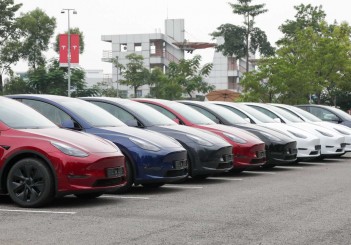The plant which began operating in November, 2014, is set to produce over 3,000 litres of Audi e-diesel over the coming months.
The plant, run by Audi partner sunfire, operates according to the power-to-liquid (PtL) principle and uses green power to produce a liquid fuel. The only raw materials needed are water and carbon dioxide. The CO2 used is currently supplied by a biogas facility. In addition, initially a portion of the CO2 needed is extracted from the ambient air by means of direct air capturing, a technology of Audi’s Zurich-based partner Climeworks.
Production of Audi e-diesel involves various steps: first, water heated up to form steam is broken down into hydrogen and oxygen by means of high-temperature electrolysis. This process, involving a temperature in excess of 800 degrees Celsius, is more efficient than conventional techniques because of heat recovery, for example. Another special feature of high-temperature electrolysis is that it can be used dynamically, to stabilise the grid when production of green power peaks.

In two further steps, the hydrogen reacts with the CO2 in synthesis reactors, again under pressure and at high temperature. The reaction product is a liquid made from long-chain hydrocarbon compounds, known as blue crude. The efficiency of the overall process – from renewable power to liquid hydrocarbon – is very high at around 70 percent. Similarly to a fossil crude oil, blue crude can be refined to yield the end product Audi e-diesel. This synthetic fuel is free from sulphur and aromatic hydrocarbons, and its high cetane number means it is readily ignitable. It is suitable for admixing with fossil diesel or as a fuel in its own right.
Audi has also teamed up with various other companies to research synthetic fuels.
It has been active in the development of CO2-neutral fuels – Audi e-fuels – since 2009. The Audi e-gas plant in Werlte, Lower Saxony, already produces Audi e-gas (synthetic methane) in a comparable manner to power the Audi A3 Sportback g-tron, which is available in countries in which a suitable fuelling infrastructure exists.
Audi is also conducting joint research into the synthetic manufacture of Audi e-gasoline with Global Bioenergies, of France. In a further project, Audi has joined forces with the US company Joule, which uses microorganisms to produce the synthetic fuels Audi e-diesel and Audi e-ethanol.










